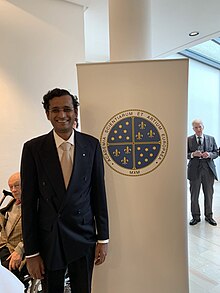Chandrashekhar Sonwane
Chandrashekhar Sonwane | |
|---|---|
 Dr Sonwane at European Academy of Arts and Science, Salzburg, Austria in 2019 | |
| Born | Chandrashekar Ganpatrao Sonwane 2 May 1972 |
| Nationality | Indian |
| Citizenship | American |
| Alma mater | Institute of Chemical Technology (B.Sc) Indian Institute of Technology Bombay (M.Sc) University of Queensland (PhD) |
| Scientific career | |
| Thesis | Fundamental studies in nanoporous and mesoporous materials (2000) |
Chandrashekhar Ganpatrao Sonwane FRAes (born May 02, 1972) is an Indian American scientist who works in the fields of space launch, air breathing propulsion and chemical and power industries. Sonwane is known for contributing to several aerospace companies including Aerojet Rocketdyne, Pratt & Whitney Rocketdyne and supported various NASA's deep space programs including Artemis 1 (Space Launch System).[1]
He was Elected as a Fellow of Royal Aeronautical Society (RAeS) and also an elected member of the European Academy of Sciences and Arts.[2]
Sonwane was the principal investigator at Masten Space Systems for NASA Lunar lander related technologies.[3]
Early life and education
[edit]Sonwane graduated with a Bachelor of Science in chemical engineering from the Institute of Chemical Technology, Mumbai. In 1996, he received Master of Science in chemical engineering from the Indian Institute of Technology, Mumbai, India. He completed a PhD in chemical engineering from the University of Queensland in 2000.[4][5]
Patents and publications
[edit]Chandrashkhar has various patents and publications to his credit. Below is the list of few.[6]
- Injector mixer for a compact gasification reactor system, March 2018, Gas Technology Institute, Inventors: Chandrashekhar Sonwane, Kenneth M. Sprouse
- Gas generator and process therefor, April 2016, Aerojet Rocketdyne, Inventors: Stephen Yows, Chandrashekhar Sonwane
- Flow splitter for a compact gasification reactor system, May 2011, Aerojet Rocketdyne, Inventors: Chandrashekhar Sonwane, Kenneth M. Sprouse
- Recuperative supercritical carbon dioxide cycle, December 2011, Aerojet Rocketdyne, Inventors: Chandrashekhar Sonwane, Kenneth M. Sprouse, Ganesan Subbaraman, George M. O'Connor, Gregory A. Johnson
- Pump apparatus including deconsolidator, July 2012, Aerojet Rocketdyne, Inventors: Chandrashekhar Sonwane, Timothy Saunders, Mark Andrew Fitzsimmons
- Fundamental Studies in Nanoporpous and Mesoporous Materials, 2000, The University of Queensland[7]
Awards and honors
[edit]
- 2020 Stellar Award - Rotary National Award for Space Achievement[8]
- Outstanding Section award for very large first place Los Angeles-Las Vegas[9]
References
[edit]- ^ "Recent Advances in Power Cycles Using Rotating Detonation Engines with Subcritical and Supercritical CO2". S2CID 161054165.
- ^ "Chandrashekhar Sonwane". projectmanagement.com.
- ^ "Surviving the Lunar Night Using Metal Oxidation Warming Systems | SBIR.gov". www.sbir.gov.
- ^ "The 4th International Symposium - Supercritical CO2 Power Cycles" (PDF). sco2symposium.com. Archived from the original (PDF) on 2018-10-28. Retrieved 2018-10-23.
- ^ Sonwane, Chandrashekhar G. (2000). Fundamental studies in nanoporous and mesoporous materials (PhD). The University of Queensland. doi:10.14264/72e73bb. OCLC 45681423. Retrieved 17 February 2023.
- ^ "Chandrashekhar Sonwane Inventions, Patents and Patent Applications - Justia Patents Search". patents.justia.com.
- ^ Sonwane, Chandrashekhar G. (2000). Fundamental studies in nanoporous and mesoporous materials (PhD). The University of Queensland. doi:10.14264/72e73bb. OCLC 45681423. Retrieved 17 February 2023.
- ^ "Rotary National Award for Space Achievement (RNASA) | 2020 Stellar Award Winners". www.rnasa.org.
- ^ "AIAA Announces Section Award Winners -- Awards Honor Outstanding Section Programming in a Variety of Categories". SpaceRef. 27 August 2021.
